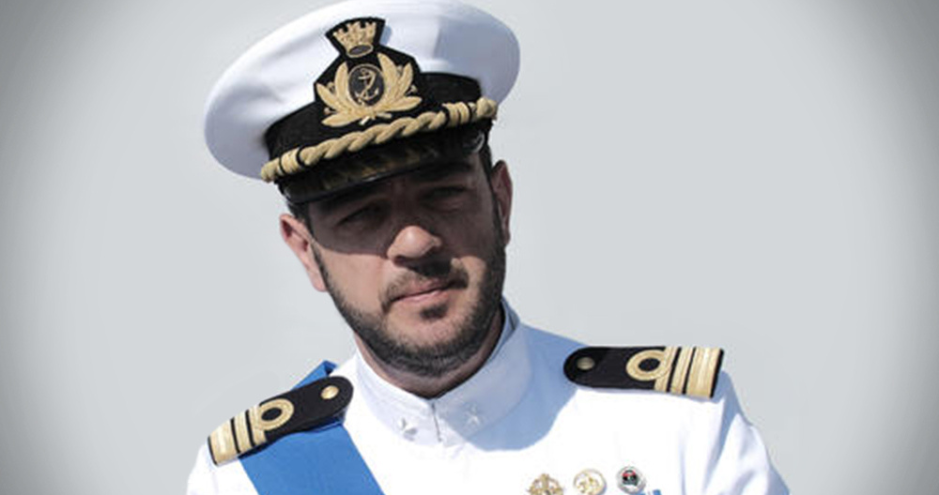Executive MBA Propels Naval Leader and Digital Security Expert's Career Forward
Luca di Giovanni has made a career out of navigating uncertainty. Even so, he’s reinforcing his professional acumen with the deep and enriching ocean of knowledge offered at the HEC Paris Executive MBA.

A key characteristic among the battle-hardened boardroom executives and captains of industry at the HEC Paris Executive MBA is leadership experience. With an average of 14 years of work experience under their belt, it’s a pretty good bet that the average EMBA participant knows how to make command decisions – even when faced with proverbially stormy seas.
Luca di Giovanni, EMBA ' 22, cohort, personifies this trait.
In class, he’s known as Luca; at work, he’s Captain di Giovanni, and command leadership is in his blood. Born into a navy family, the Taranto native is a third-generation naval officer. His career as an officer, which started immediately after high school, has already hit the two-decade mark, and he’s carved out a niche for himself as a specialist in information security.
“Digitalization has changed the naval environment,” he says. “It’s more complex, more connected, and more interconnected to the daily routine. It’s essential to ensuring that the ship is in a safe environment at sea.”
Reckoning with the digital headwinds
In the age of social media, making people aware of the stakes in a constantly evolving digital environment is a constant challenge. And that, Luca says, is why he chose to do an Executive MBA at HEC Paris.
Making consequential decisions at sea for a ship embarked with a crew of 200 is just part of the job for Luca.
“The point of the EMBA is to do something new. You have to choose whether to focus on something brand new, or something you already know. For me, I’m very interested in innovation. When you think of an organization like the navy, tradition is one of the first things that comes to mind, which is good, but it can be difficult to innovate.”
The innovation on offer at HEC, Luca says, is just one way to learn how to better connect a new generation with traditional values.For him, that challenge manifested itself most recently – and poigantly – when the first wave of COVID hit. He was embarked as commanding officer on one of the Italian Navy’s 10 FREMM warships, 6,700-ton multi-mission frigates with a complement of 200 sailors.
“In the beginning, the main concern was related to people and their families. People were worried, so my responsibility as commanding officer was keeping everyone safe and making sure they could do their job independently of what was happening at home.”
“The environment at the best of times is variate, but in terms of information security, it’s much more complex than it ever was in the past.”
The challenge of maintaining the crew’s mission readiness, not to mention morale, in the face of a rapidly deteriorating situation at home – literal safe harbor in normal circumstances – was unlike any Luca could have ever trained for. But that uncertainty is a microcosm of an until-recently underappreciated reality that military professionals face on a regular basis.
“In the collective imagination, the military environment is structured: same problem, same solution. In reality, it’s much different. The environment at the best of times is variate, but in terms of information security, it’s much more complex than it ever was in the past.”
Having navigated those troubled waters successfully, he was uniquely positioned to offer perspective on HEC’s COVID response when he started the program the following September.
“I found great attention from the school leadership to avoid the virus spreading. Some of the rules implemented by the school were the same we had been following on the ship. The school did a great job with social distancing, requiring masks, and preventative measures. All these efforts ensured the greatest benefit of an EMBA – connecting with people – was maintained for the participants. They wanted to keep everything as normal as possible, but to keep people safe. That’s the same message I was communicating as commanding officer on the FREMM.”
“It helps us to better manage uncertainty. When you think about how interconnected people are, you realize there’s really a huge challenge in terms of vulnerability and uncertainty.”
Similarities in crisis response aside, the EMBA offers a world of new solutions to common problems, which was another key factor that Luca considered when applying for the program – especially with regards to managing data in a corporate environment.
“It helps us to better manage uncertainty. When you think about how interconnected people are, you realize there’s really a huge challenge in terms of vulnerability and uncertainty,” he says.
He brought up one of the most universally eye-opening sessions, held during the first days of the EMBA, as one way he’s seen this in action.
“There was a Fidelio session in the beginning in which you share a personal or professional experience to your cohort-mates, and then they share how they would have dealt with those problems. The way people deal with problems in different business sectors is the same. It’s strange, this exercise. You put these strangers together in a room, you ask them to share something extremely personal, and then you ask for their input. You feel free to share, and it's something that allows you to be sincere with yourself.”
The critical difference
Though Luca isn’t even halfway into his time as an EMBA participant, he’s already seeing clear results when he goes back to work in between modules.
“The HEC slogan [‘Learn to Dare’] is really true in the program. They push you to think outside the box. There's no pre-packed information or a way of teaching things; they push me to think critically about absolutely everything.